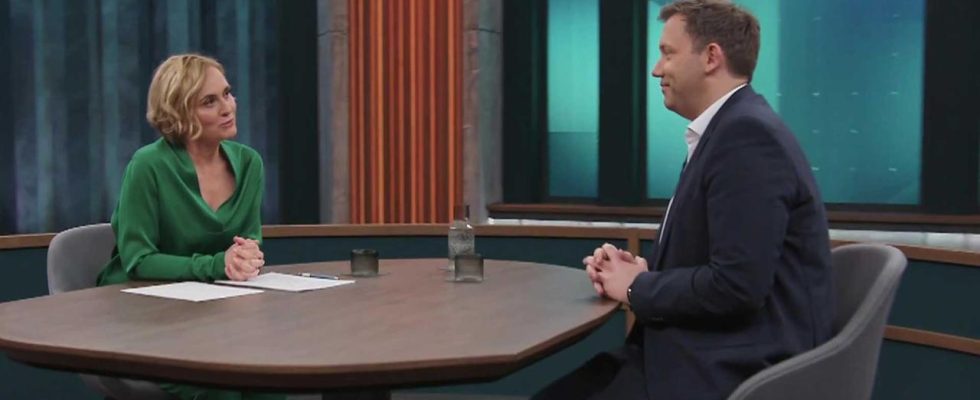Statements by SPD parliamentary group leader Mützenich about the war in Ukraine caused strong criticism – including in the coalition. SPD leader Klingbeil defended Mützenich and spoke Caren Miosga from a “targeted misinterpretation”.
The reason for the visit of SPD leader Lars Klingbeil Caren Miosga could hardly have been more timely. Last Thursday, the SPD parliamentary group leader, Rolf Mützenich, caused a stir with a speech in the Bundestag. In the plenary session he spoke of “freezing” the war in Ukraine and subsequent peace negotiations with Russia. Mützenich described the criticism of Chancellor Olaf Scholz from the opposition and traffic light politicians as “malicious.”
The SPD parliamentary group leader was criticized several times for his choice of words – including from the traffic light parties. Foreign Minister Annalena Baerbock sat on the government bench visibly annoyed during the speech and shook her head energetically. The Greens and FDP refused to applaud Mützenich during his speech.
Criticism from Nouripour in the report from Berlin
Green Party leader Omid Nouripour was also present on Sunday evening ARD-Broadcast Report from Berlin clear words. Mützenich’s stance had nothing to do with the SPD’s party conference resolution: “It is not the policy of this coalition.”
Nouripour further explained: “The Social Democrats, especially Lars Klingbeil, the party leader, have done a lot in the last two years to collect and update the wrong Russia policy of the last few years.” Now there is a need for discussion there.
Klingbeil: “Targeted Misinterpretation this speech”
Klingbeil himself said on Sunday evening in the ARD-talk show Caren Miosga: “I think reducing Rolf Mützenich’s speech to this passage is a deliberate misinterpretation of this speech.” According to the party leader, it is an “incredibly controversial situation” that the traffic light government finds itself in. Mützenich was simply asking a legitimate question and is not alone in his stance: Ultimately, Ukrainian President Volodymyr Zelenskyj would also call for peace negotiations, said Klingbeil.
Zelensky does indeed call for peace negotiations, but at the same time he cites the withdrawal of the Russian army from the occupied territories in Ukraine as the basis for talks. This is completely opposite to the idea of “freezing” the conflict, as Rolf Mützenich had called for. A “freeze” would mean the current status quo, i.e. the retention of the areas occupied by the Russian army.
Klingbeil: There is no doubt which side the SPD is on
Klingbeil sharply rejected the accusation that the Social Democrats were refusing to support the country in the war of defense: “Nothing that Rolf Mützenich says and what the SPD stands for suggests that we are making decisions about the heads of the Ukrainians,” he said Blade ax further. There is no doubt in Ukraine which side the SPD is on, as the weapons deliveries and financial support to date show.
Regarding the Chancellor’s power in the matter of “Taurus” deliveries, Klingbeil explained: “In the end, Olaf Scholz bears responsibility for the political decision.” If the Chancellor decides that a delivery of “Taurus” would pose too great a danger to the Federal Republic, then we have to accept that. “I think this decision should be treated with respect.”
Klingbeil defends the traffic light pension concept
In the subsequent round, SPD leader Klingbeil, journalist Helen Bubrowski, the deputy editor-in-chief of “Table.Briefings”, and economist Moritz Schularick, president of the Kiel Institute for the World Economy, discussed the economic situation in the Federal Republic and the planned pension package.
The traffic light government’s new concept primarily provides for securing the pension level at 48 percent. It also includes the introduction of a stock pension under the name “generational capital” and the limitation of increases in pension contributions.
“A drop in the ocean”
Economist Schularick criticized the concept: “Generational capital is fundamentally a good idea. But it’s a drop in the ocean.” According to him, things are currently bad for the German economy and, accordingly, the security of pensions. The proposed corrections are inadequate.
Klingbeil ignored the criticism. In recent weeks there has been disrespectful talk about the traffic light’s plans, although it would implement many social projects, such as the minimum wage: “The best pension policy is a sensible wage policy. That’s why the SPD is committed to it.”
“Very bitter debates that need to be had”
This is the same answer that the Chancellor gave, said journalist Bubrowski. In the past, there would have been six working contributors for every pensioner, but now that is no longer the case: “I think when I retire, it will be my poor son who will have to take care of me.”
According to Bubrowski, the SPD cannot promise stable pension levels because it cannot stop demographic change on its own. The party must therefore reduce the pension level in order to make the system future-proof. “These are very bitter debates,” said Bubrowski, but they need to be held.
When asked about the problems of the welfare state, SPD leader Klingbeil explained: “We have to think about the debt brake so that more can be invested in this country.” However, he rejects saving money on the welfare state.

